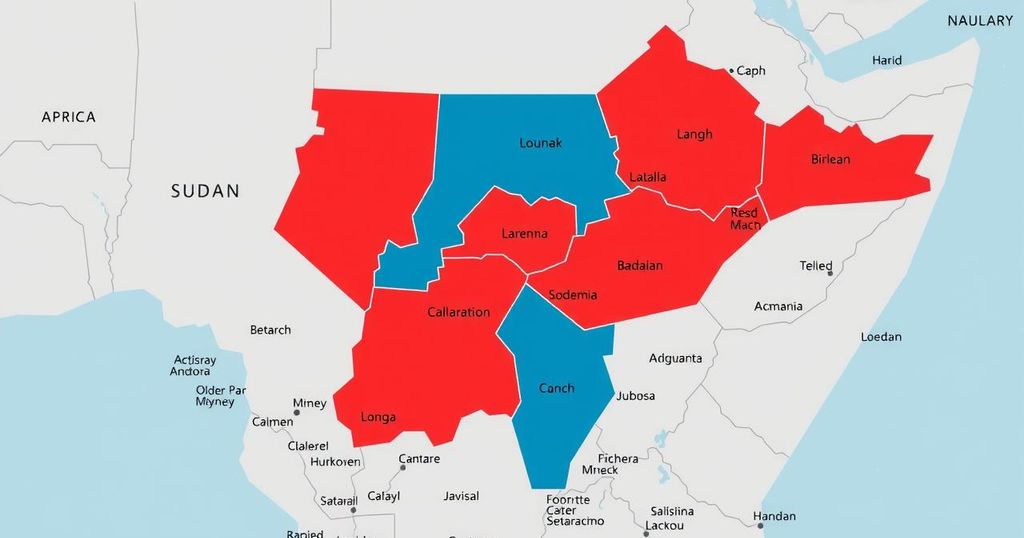Sudan’s civil war is approaching its second anniversary, revealing a dire humanitarian crisis affecting 30 million people. The conflict involves two warlords, leading to potential partition amid failed ceasefires and rising violence. International responses are cautious, with fears that fragmentation could heighten instability in the region. Some suggest partition might stabilize the situation, though skepticism remains high.
As Sudan’s civil war nears its two-year mark on April 15, the nation faces a critical phase of potential division. This conflict involves two rival warlords: Gen. Abdel Fattah al-Burhan of the Sudan Armed Forces (SAF) and Gen. Mohammed Hamdan Dagalo of the Rapid Support Forces (RSF). The situation not only destabilizes Sudan but also threatens the broader Horn of Africa region, which is politically fragile.
The humanitarian crisis in Sudan is dire, with UNICEF reporting that around 30 million people, or two-thirds of the population, are negatively impacted. Over 14 million, including approximately 3.5 million refugees fleeing to neighboring countries, have been displaced. The death toll is at least 20,000, with potential for much higher figures due to unreported violence, alongside substantial economic declines projected at 48% by 2025 with $15 billion in losses.
Sudan’s history of internal conflict and governance issues spans from its independence in 1956, marked by 15 military coups and two civil wars, claiming 1.5 million lives and leading to South Sudan’s independence in 2011. Ongoing violence in Darfur has seen over 200,000 deaths, with the Janjaweed militia attacking non-Arab Muslims. The current crisis began under the 30-year dictatorship of Omar Hassan al-Bashir, overthrown in April 2019, leading to two years of fragile cohabitation between military and civilian powers before a coup reinstated military rule in October 2021. Street protests seeking civilian governance continue amidst intensified conflict.
Efforts for ceasefires have repeatedly failed, with short-lived truces offering no respite as SAF has gained ground against the RSF in central Sudan and around the capital, Khartoum. The RSF still maintains control over substantial territories, such as Darfur and parts of Kordofan. Numerous regions are now contested or dominated by local militias with fluctuating loyalties, further complicating any resolution.
Both SAF and RSF are making attempts to consolidate power, with the RSF signing a charter for a new government aimed at establishing regional autonomy, while SAF proposes creating a civilian-led government. However, both factions are perceived as representing their personal ambitions rather than the desires of the Sudanese populace.
International reactions have been apprehensive, with warnings issued by the UN Security Council concerning the RSF’s actions, which could exacerbate an already critical humanitarian crisis. The African Union underscored the danger of such moves leading to Sudan’s partition, urging global actors not to acknowledge any parallel governmental structure that threatens national unity. Concerns also linger about an RSF-led state further destabilizing the region, given that it could exacerbate tensions with neighboring fragile states.
Despite widespread opposition to partition, the focus on the Sudanese civil war is relatively muted in the international arena, as countries navigate competing interests. While the SAF enjoys support from nations like Egypt and Turkey, the RSF allegedly receives backing from the UAE and other regional powers, leading to a complex geopolitical landscape.
Some analysts suggest that partitioning Sudan into manageable regions could stem the decay of civil conflict, allowing each faction to consolidate control and potentially stabilize their respective areas. However, this perspective may be overly optimistic, considering two years of violent conflict that have left deep scars across the nation.
The ongoing civil war in Sudan, precipitated by the ambitions of two warlords, poses severe humanitarian and geopolitical risks, marking a critical transition towards potential partition. As international responses remain cautious, the division of the nation could either exacerbate regional instability or, conversely, lead to an end to conflict—though skepticism about this outcome prevails in light of past violence. Ultimately, the future of Sudan remains precarious, with crucial implications for both domestic governance and broader regional peace.
Original Source: www.ndtv.com






